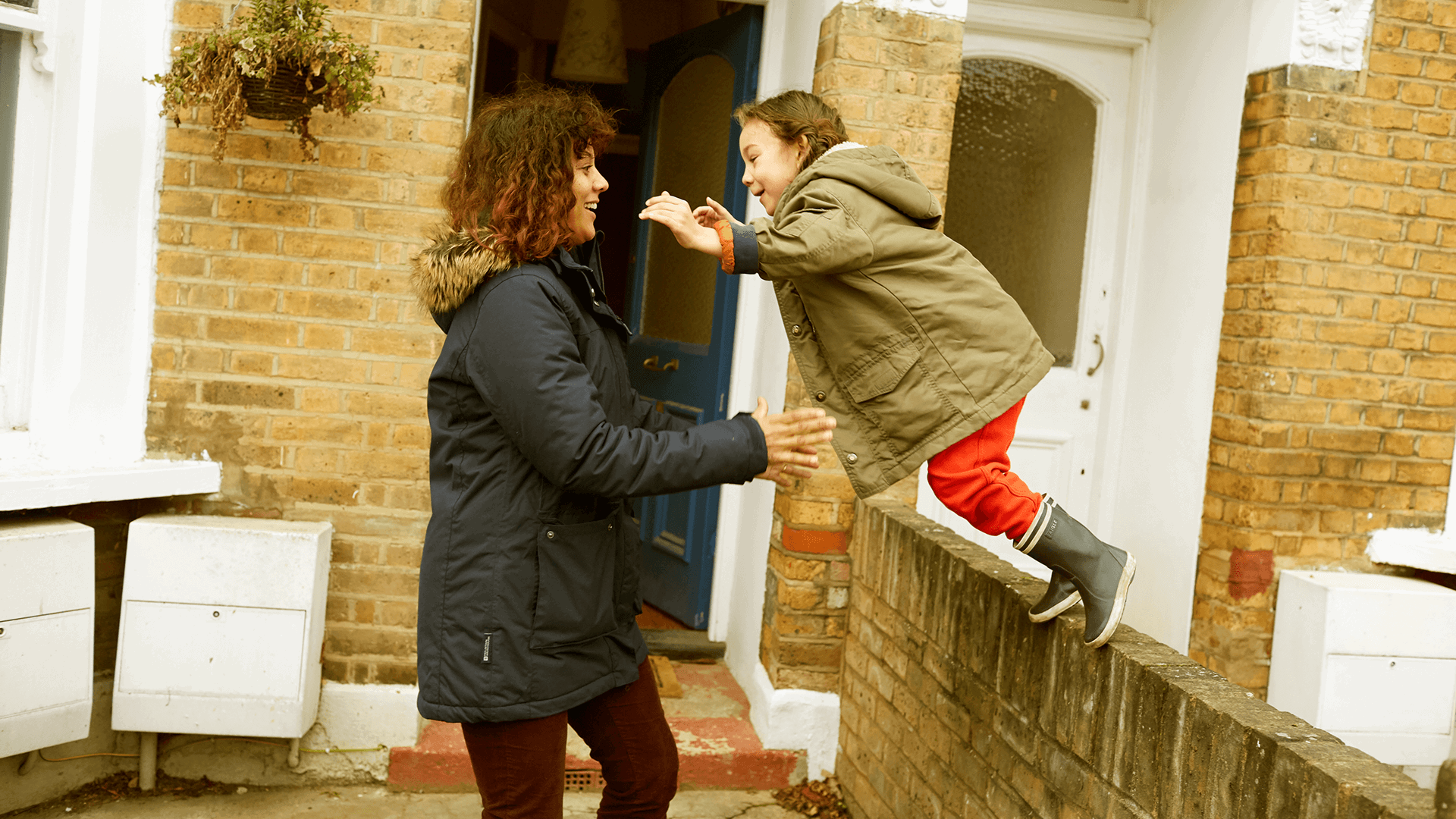Juggling work, life and parenting. Supporting a child who’s struggling with their mental health. Managing your own mental health challenges. The pressure to balance it all can feel overwhelming.
When you care for others, it can be hard to care for yourself. But doing so can give you the energy, capacity, and resilience to cope with life – and to be the best parent or carer you can.
In this guide, we’ll explore how you might be feeling and what you can do to look after yourself, from self-care to connecting with other parents and talking to professionals.
Why it’s important to look after yourself
Your mental health is important – just as important as anyone else’s. And you deserve as much love and compassion as you give your children.
Regularly taking time for yourself can help you manage your own mental health, preventing things like anxiety and depression. And it can help maintain your physical health too.
To look after others, you need to look after yourself. Taking time for emotional and physical care gives you the energy, resilience and compassion to care for your young person, helping those around you cope better too.
Look after your own mental health, too. We forget ourselves and become these machines that try to support our kids. But it’s important when you’re supporting somebody to also be looked after yourself.
How you might be feeling
We spoke to parents and carers, who shared some of the feelings they find make it harder to look after themselves.
Many parents and carers told us they felt guilty about taking time to look after themselves. They felt the demands of parenting required more attention than their own wellbeing. Time spent looking after themselves felt indulgent.
Parents also told us they felt guilty about what their child was going through, and that those feelings made their own mental health worse. Some said they felt “powerless” to help their child, making them feel even more guilty.
When young people were struggling, many parents and carers said they blamed themselves, asking themselves if they were at fault. You might be thinking: “am I doing something wrong?”.
This can be particularly difficult if you’re finding it hard to get the right support for your child, if interventions you’ve tried already aren’t working, or if services aren't listening. This left some parents we spoke to feeling as if they had “failed” their young person – especially when comparing themselves to other families they knew or saw on social media.
Even if your child isn’t struggling with their mental health, parenting can be exhausting. Your young person may experience all sorts of challenges. And you might be balancing parenting alongside work, financial pressures, housework, other caring responsibilities, and any number of other tasks. This can make it very difficult to take the time and space to look after yourself, leaving you physically and emotionally exhausted.
For those supporting a child with their mental health, there are additional pressures to manage family dynamics, balancing the needs of other children and partners while one child is in crisis. You might feel pulled in lots of different directions.
As well as the day-to-day stresses of parenting, you might be experiencing external pressures. You or your child might be on a waiting list for therapy or counselling, or be trying to navigate CAMHS or school systems. Or you might be feeling the weight of the cost-of-living crisis, discrimination, a hostile media environment, or world events.
These systems are not always easy to navigate. They can be incredibly frustrating and make you feel like you’re going round in circles.
Parenting is difficult, and can be even harder if your child is going through something too. You might not feel able to speak about what’s going on with other parents/carers, or are comparing yourself to people online. You might have opened up about your own or your child’s mental health and been left feeling misunderstood.
It’s important to remember that all of these feelings are completely normal. And they’re also worth paying attention to. Just as you would support a loved one experiencing self-doubt, burnout, or loneliness, your own feelings are valid and worthy of time, attention, and care.
There are also lots of things you can do to help with these feelings, and ways to build in small steps to your daily routine to help you cope.
Simple self-care

Washing the dishes. Finishing a work project. Doing the school run. Organising appointments with CAMHS. It probably feels like your to-do list is absolutely endless. When you’re going through so much, looking after yourself can feel like an extra chore – just another task to tick off. Your wellbeing might seem like the very last priority for you right now. But self-care is crucial.
When you’re under a lot of pressure, it can be frustrating to receive advice about simple self-care. If you’re trying to navigate mental health services, a cup of tea or a bath isn’t going to make things feel immediately better, and suggestions like this can feel short-sighted.
But there’s lots of evidence that these things do work. Taking just five minutes to engage in small acts of self-care can make things feel less overwhelming, giving you the time and space you need to sustain yourself, recharge, and protect your mental health.
Nobody ever mentioned to me that it would be useful to have ‘me time’. I didn’t know how important it was until I reached a point where it became a problem. Take the time when you’re feeling well to make a big list of things to refer to when you’re having a bad day. What small thing can you do today for yourself?
When we spoke to parents, they shared a number of things that helped them stay well through tough times:
-
Small, achievable acts of self-care
Lots of parents told us that they spend five or ten minutes a day doing something that makes them feel good – listening to a favourite song, taking a break for a cup of tea, or texting friends to let them know how they are. Sometimes the small steps made all the difference.
-
Shared activities
Looking after yourself doesn’t mean doing things alone – in fact, many parents told us that shared activities with their children helped them decompress and look after themselves. Try crafting, going for a walk, watching a TV show you enjoy, cooking together, playing board games, or just taking five minutes to share parts of your day together.
-
Engaging in creativity
Lots of research suggests that creativity can be great for our mental health, and parents told us this helped them too. Whether it’s knitting, painting, cross-stitch, collaging, carpentry or writing, creativity can help you express yourself emotionally, engage in mindfulness, and have fun while you’re at it. You could also share this with the rest of the family as a way to connect as well as unwind.
-
Getting outside
Lots of parents told us that they struggled to get out and about, despite knowing that nature was great for their mental health. Research also suggests that nature can have a hugely beneficial effect on our mood and levels of anxiety and stress.
You can’t always spend hours outdoors. But even a ten-minute walk, or five minutes with a cup of tea in the garden, can help you reconnect with nature. -
Physical activity
We all know that exercise can help our physical and mental health. When we spoke to parents about how they incorporated this into their daily lives, there was lots of variety.
This isn’t about spending hours in the gym. Some parents enjoyed going for walks with their children. Others cultivated yoga practices using online guides. Some did activities like gardening. And some people told us that even five minutes dancing to their favourite song was enough to boost their mood. -
Remembering yourself
These tips aren’t going to remove the stresses and strains from your life. But having a self-care practice can be a good way of keeping yourself well, and can act as a reminder that you deserve to look after yourself too.
Getting support from others
No matter how good you are at self-care, you still need support from others. In fact, when we spoke to parents, strong social connections were one of the things they said most helped them to cope.
There are two key ways you can get support from others.
There are two key ways you can get support from others:
You might already have friends or family who you feel comfortable opening up to, and who know what you’re going through. If this is the case, these networks can be a really important source of support.
Sometimes, you might just need someone to talk things through or vent with, or to ask for emotional support. On other occasions, you might want to ask friends or family to help you with taking children to appointments, helping with household chores, or other practical tasks.
It might be difficult for you to share what’s going on with friends and family, or you might fear being misunderstood. Sometimes it’s easier to talk to people who are going through the same thing, but aren’t connected to your daily life.
You can connect with other parents by:
- Contacting your local parent/carer forum. This is a support group run by and for local parents and carers whose children have SEND (Special Educational Needs or Disabilities). You can search for your local group online or use Contact’s directory.
- Joining Facebook or other online groups that focus on parenting and mental health.
- Using the Charlie Waller parent support network to see if there’s a local parent support group in your area.
- Speaking to your GP about local peer support groups.
- Setting up your own parent support group using our guide.
Talking to a professional
If things are getting really difficult, you might want to talk to a professional about what’s going on. You can do this by:
If you’re struggling with low mood or anxiety, chat to your GP. They can signpost you to local organisations, peer support, wellbeing support, or counselling or psychotherapy services. They may also help you think about medication, if that’s something you feel might help.
If you’re able to pay, another option is finding a counsellor or psychotherapist to speak to about what’s going on. When looking for a private therapist, it’s a good idea to:
- get recommendations from people you know and trust
- search for someone trained or experienced in working with your specific concerns
- ask the therapist to explain how they work and to tell you what their qualifications are
- request a consultation so you can see if the therapist is a good fit – some offer free initial sessions so you can make sure they’re right for you
- if you need to, check if the therapist offers reduced prices for those who are unemployed or on a low income
- confirm the cost and likely length of therapy before you start seeing them
It’s very important to make sure that the private therapist or counsellor is fully qualified so the support you get is helpful and safe. You can use these websites to find qualified therapists who are registered with a professional body:
- The British Association for Counselling and Psychotherapy (BACP)
- The UK Council for Psychotherapy (UKCP)
- The Counselling Directory
- The British Association for Behavioural & Cognitive Psychotherapies (BABCP) – for cognitive behavioural therapy (CBT)
- The Black, African and Asian Therapy Network (BAATN) – to find therapists from Black, African or Asian backgrounds
- The Muslim Counsellor and Psychotherapist Network - to find Muslim counsellors and psychotherapists
- Pink Therapy – for therapists with experience working with LGBTQ+ people
- The British Association of Art Therapists (BAAT) - for accredited art therapists
If your child is struggling with something specific, you may want to speak to an organisation specialising in those concerns. You could contact OCD UK, the National Autistic Society, BEAT, or Gendered Intelligence, for example.
Our Parents Helpline also provides detailed advice and information, emotional support, and signposting if you’re worried about your child.
If you want to talk about your own mental health, you can contact Mind or Samaritans.
You might also find helpful...
Useful helplines and websites
-
YoungMinds Parents Helpline
We support parents and carers who are concerned about their child or young person's mental health. We can provide detailed information and advice, emotional support and signposting.
You can speak to us over the phone or chat to us online. When we’re closed, you can still leave us a message and we'll get back to you in 3-5 working days.
- Opening times:
- 9.30am-4pm on Mondays, Thursdays and Fridays; 9.30am-6pm on Tuesdays and Wednesdays
-
Family Line
Provides information and support around family issues, as well as longer-term help through Befrienders and Counsellors.
- Opening times:
- 9am - 9pm, Monday - Friday
-
Samaritans
Whatever you're going through, you can contact the Samaritans for support. N.B. This is a listening service and does not offer advice or intervention.
- Opening times:
- 24/7

This page was reviewed in November 2024.
It was created with parents and carers with lived experience of navigating the impact of their child's mental health on their own wellbeing.
We will next review the page in 2027.
YoungMinds is a proud member of PIF TICK – the UK's quality mark for trusted health information.
Whether you love the page or think something is missing, we appreciate your feedback. It all helps us to support more young people with their mental health.
Please be aware that this form isn’t a mental health support service. If your child is in crisis right now and you want to talk to someone urgently, find out who to contact on our urgent help page.
At YoungMinds we take your privacy seriously. If you’d like to read more about how we keep the information we collect safe, take a look at our privacy policy.





